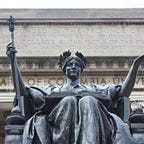Young Argentine Voters Divided on Argentine General Election Ballotage
GILDA DI CARLI
Matías Perez Alati Brea’s eyes widened as his mind relived moments from Sunday, October 25th: the first round of general elections in Argentina. Brea, a first year law student, spent the day at a voting post in Morón, a suburb of Buenos Aires, as an electoral officer for an opposition center-right party, Cambiemos (let’s change). The official party has governed his district for decades.
“I woke up thinking, ‘by the time I go to sleep tonight, I will still have a governor that is a drug trafficker.” Brea was referring to Aníbal Fernandez, a candidate for the official party (Frente para la victoria) running for reelection as governor of the province of Buenos Aires. A Wikileak cable from 2007 linked him to narcotics trafficking.
Official party candidate, Daniel Scioli has promised to continue leftist populist policies, as the Kirchner administrations have done since 2003. But Mauricio Macri, current mayor of Buenos Aires, has vowed to break this tradition, as his liberal economic platform focuses on opening the Argentine economy to outside markets, with ends to currency controls.
Eyes gleaming, Brea described how he felt as Macri’s party gained momentum over the course of the day. « We found ourselves in a new scenario. Argentines are able to change. It’s a healthy rebellion, » he said.
At 10 pm in the headquarters of the party in the capital district of Buenos Aires, Brea got the news. Voting results placed Mauricio Macri merely three percentage points behind Daniel Scioli: 34–37. In a mass of “crying, hugging, kissing, everyone was completely emocionado…moved by the situation,” many in the room muttered to him, “Well, we did the impossible.”
The spotlight then shifted onto Macri. Many young Argentines have been asking themselves: would Macri restore democracy and economic stability to the nation or would his liberal economic policies open the door to financial bankruptcy? This fear has been fueled by a recent past. In the 1990s, former President Carlos Menem’s privatization policies catapulted the country into the 2001 economic crisis. As both candidates approach the final round “ballotage” on November 22nd, Macri has attempted to distance himself from that starched-coat businessman image by drawing closer to the working-class.
Milena Zanelli doesn’t buy it. The 24-year-old remembered when Nestor Kirchner came to power. “All of a sudden, we no longer saw the president driving around in a Ferrari. He was traveling to the countryside to speak with school teachers about salary issues,” she said. She didn’t think Macri could have this kind of connection with Argentines.
Zanelli’s support for the official party came from the Kirchner administration’s work on women’s rights, but she also was worried about Macri’s reforms in the education system. The philosophy student underscored Macri’s announcement about downscaling programs in the social sciences including philosophy, history, geography, art, and civic education.
But other voters were more concerned with their financial futures. “Listen to something concrete,” Gabriel Mugni said on the phone as he rolled out pizza dough. “If Cambiemos wins, he’s going to cut salaries, remove restrictions on people who can buy foreign currency and get rid of subsidies. These are all measures that help the upper-class more than working class.”
“If my rent rises from 9000 to 1000 pesos and my electricity from 500 to 700, values go up to the clouds,” the 26-year-old said.
Gabriel has worked at Estudio Contable Marjbein as a deliveryman for banks and businesses for five years. While out on the street delivering checks and documents, he has seen shopping centers, bars and restaurants often full. In his opinion, Argentines complain they are suffering economically but there is no comparison to 2001. “Argentines are simply living beyond their means,” he said. Mugni has saved up for a 3-year culinary program at the UTHGRA beginning in April. He plans to travel by cooking- to USA, Japan, France, the Middle East.
In the meantime, “neither [candidate] seems to me to be a panacea, but neither is going to carry the country forward,” he said. He made his decision by thinking, “which one will do the least harm. Scioli’s camp already has a model and a team.” He simply doesn’t “trust” Macri’s team.
“But listen, I’m not saying Kirchnerism is magical,” he said, He recognized that there have been many cases of corruption and impunity. He listed former Transport minister, Ricardo Jaime’s, illicit gains; Aníbal Fernandez’s, connections with drug trafficking, and the death of Alberto Nisman, a prosecutor found dead in his apartment the morning he would present documents incriminating the president in a terror plot cover-up. This last case has mobilized thousands of citizens to the streets of Buenos Aires in anger over lack of transparency in the investigation.
But Mugni didn’t find cases of corruption to be particularly unique to the Kirchners. “There was never a candidate with a clean record — always a stain.” Mugni was upset at his choices, but he said he has never left the voting booth happy.
